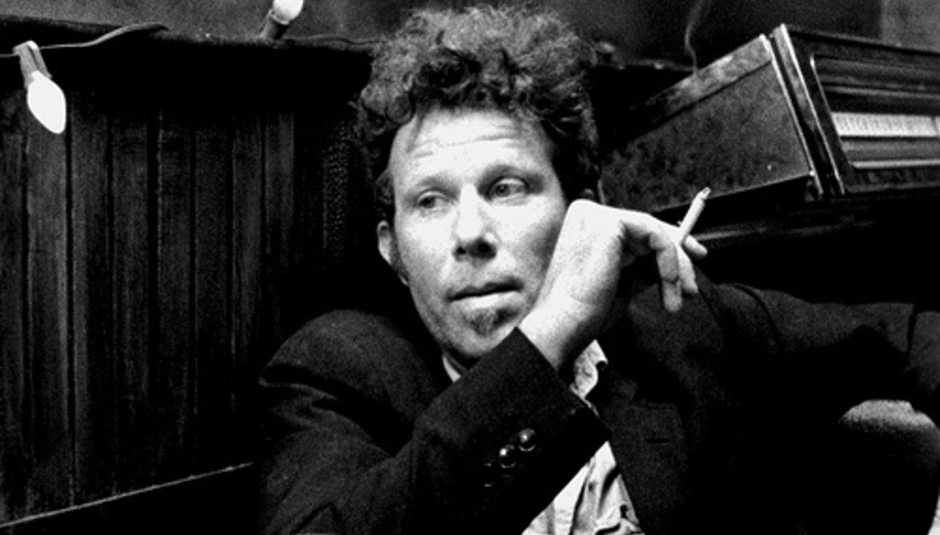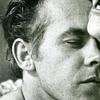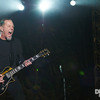On the 13th July 2011, the Barbican Centre will host a special live show, Rain Dogs Revisited, with a host of guest artists reinterpreting tracks from Tom Waits' legendary album. David Coulter, the multi-instrumentalist who worked with Tom Waits on The Black Rider, will be the concert's musical director, joined by a host of guests, including St Vincent, The Tiger Lillies, Seb Rochford, Arthur H, and Camille O'Sullivan.
Christophe Chabert spoke to David about his history with Tom Waits and his approach to revisiting the album for the new show...
Interview with David Coulter by Christophe Chabert
When did you discover the album Rain Dogs?
I had been a fan of Tom Waits for quite a while. The first time I remember actually seeing him was performing on the BBC’s Old Grey Whistle Test. I was 17 years old, it was in 1979 and he was incanting 'Burma Shave', a bit “à la Jack Kerouac” and it really amazed me. I heard this indescribable voice and imagined it was some old bluesman and then when I saw who it was I discovered a young old man wearing a beaten up second-hand suit and a battered hat. I followed his career after that and on the day Rain Dogs came out, I took the train up to London and headed straight for the Virgin Megastore where I bought the album both on vinyl and on cassette. When I got home and listened to it for the first time, it blew me away!
Did this record surprise you compared to what you already knew about Tom Waits?
Not exactly. Two years before that, he had released Swordfishtrombones and that album was really different from what he had done up until then. It was much more exotic with a hugely varied and unusual instrumentation. At that time, I wasn’t really a musician. As a young child, I learned to play the violin but I quit when I was 14 or 15 years old. And it I suppose it was listening to Swordfishtrombones and Rain Dogs that encouraged me to start playing music again. I could hear sounds that corresponded exactly to what was in my head and that I wasn’t hearing in any other music I was listening to at that time. It was a new kind of music but which seemed to have its roots in older styles of music. I was very into folk music and could hear elements of that but also these sublime melodies, bold and radical instrumentations and extraordinary lyrics plus this unbelievable “otherness”.
Rain Dogs and the trilogy from which it is taken are completely out of the musical fashion of that time – there are no synthesizers for instance and an organic style. Was that what aroused your interest?
Absolutely. I love acoustic music; I love to hear people who master their instruments, who really know how to play, who can really express themselves. It was the first time I heard the playing of Marc Ribot, who I didn‘t know at that point; he was a relatively unknown guitarist at that time and was one of the key elements to the sound of Rain Dogs. There were many other styles of music at that time but in the mid 80s, pop music was by and large pretty dreadful. Punk was already history. Waits was possessed of a true Punk spirit and I really admired his attitude towards the Music Industry: he had clearly decided to remain outside the system. When you have spent twenty or thirty years listening to his music, you begin to recognize where he draws his influences from, you listen to some of the things that have inspired him, but at that time Waits’ universe seemed experimental and unconventional to me. I loved it!
You were brought to work with Tom Waits on The Black Rider. How did this experience change your view about Tom Waits’ music?
This happened much later on, almost twenty years later. In 2004, I was asked to put together a band for Tom and Robert Wilson for the Barbican’s resurrection of the stage version of The Black Rider. Tom knew of my work with The Pogues and he had listened to a solo album I had made and he must have appreciated my musical universe. So I formed this band and chose people I knew, people I had already worked with before. And I had the amazing opportunity to work with Tom. When you meet your hero, it can be either fantastic or terrible. With Tom, it felt as if we already knew each other. I must also mention Tom’s wife Kathleen Brennan, they are true partners; they are like yin and yang. I worked with them and Robert Wilson whose work I had studied at College. It was thanks to record of The Black Rider released in 1993 that I started to learn to play the musical saw; and that’s one of the ways I have earned my living for more than ten years. It was a great honor to have been involved with this project. It was an incredible adventure.
You are a multi-instrumentalist. Does your thirst to play so many instruments come from the influence of Rain Dogs – knowingly or unknowingly?
I was very influenced by that record and by the other two albums in that trilogy Swordfishtrombones and Frank’s Wild Years. That’s when I started to play around with exotic instruments. I played the violin, the Jew’s harp. I always had a tendency to pick up instruments; when I was over at someone‘s place and there was an instrument lying around, I would try to produce sounds out of it. I was a kind of exploration for me. Rain Dogs inspired me to experiment, to find other ways of getting sounds out of instruments. I had found an old broken mandolin at my grandmother’s place, my father gave me an old acoustic guitar and after that I tried to learn to play a different weirder instrument every year. Shortly after this I met Arthur H. and ended up playing in his band for a few years. When we first met in London at the end of the 1980s, one of the first things we discovered that we had in common was a shared love of the album Rain Dogs. Arthur’s own first album is often compared to Tom Waits and I don’t think it was purely by chance that we met.
How were you offered the project of doing a live version of Rain Dogs and how did you react?
Marc Cardonnel from Les Nuits de Fourvière knew of my work with Damon Albarn, Hal Willner and Marianne Faithfull and Richard Hawley among others. Last year I was asked to be the musical director for the production Let It Be live which was apparently a great success for the festival. We had decided to try and work on something else this year. There were many ideas floating around but we quickly came to focus on Tom Waits. I suggested a tribute night dedicated to Waits’ career. In the end, we thought that taking probably his best known record, containing songs such as 'Singapore' or 'Tango Till They’re Sore' would be a good solution. It is the second in what will hopefully become a series of album-tribute concerts that we want to go beyond being just carbon-copies of the originals. We will however respect the Spirit of Waits: songs are living things; the version you listen to on the record is merely the reference version, the archive. Tom rarely performs his songs with the same musical arrangements; he often changes the style, the groove, and the instrumentation. He revisits his own music constantly.
Were you worried about how he might react to the project?
I said I would only agree to do the project if Tom and Kathleen gave me their blessing. I wrote to them and they said: "Do what you want with it, good luck and bon voyage!" I would not have wanted to undertake this journey without Tom and Kathleen’s agreement. I hope it means they trust me!
How did the idea of the concert unfold? What were the directions?
I always start with the musicians. The ideal scenario is to work with incredible players who are filled with the same sense of adventure and exploration as me. The music of Rain Dogs demands a free and open-minded spirit. My address book is filled with brilliant musicians I have worked with over the last 20 years or so, so I started to put together my ideal band but I also had to think about the featured guests. I knew I couldn’t have 19 guests, one for each piece. I have to think about how things will evolve and to work out strategies, like devising a piece of theatre. It was like a big casting, Marc and I were exchanging recordings of people we liked, we made lists, we started editing the lists and made our enquiries. Many of the people we asked said yes, fortunately. In the end, we ended up with a cast of very diverse artists who all have a radical spirit and who are all fans of Waits’s musical universe. Camille and Arthur are both old friends but what is interesting and exciting for me is to get the chance to work with artists I‘ve wanted to work with for a long time. As I listened to their records I started to think about the songs which would fit into their own musical landscapes
You are the one suggesting the songs rather than them asking for certain ones instead of others?
It’s a little bit of both. With Let It Be live, I asked the guests what songs they might want to do. With Rain Dogs, each of the artists could interpret all of the songs on the album in their own style. Some made suggestions. For instance, when I spoke to Erika Stucky for the first time, she spontaneously made a list of the three songs she was interested in, explaining that her main reason for picking those particular songs was that she thought that probably no one else would want to try them! Arthur H. had also spoken to me ahead of time and suggested two or three. He was the first artist to agree to the project and I figured it was ok to let him decide on the songs he wanted to perform. The concert takes place in July; we have time to find our way of adapting the pieces and of re-telling these stories. And we’ll take the time to explore the sounds that we’ll have on stage. I don’t want to reproduce exactly the same instrumentation as in the album. That’s the 'revisited' dimension. All the musicians in the band are both friends and musical colleagues and they are all astonishing artists in their own fields: Steve Nieve, who’s been accompanying Elvis Costello for many years as well as playing with countless other great singers, is a sublime pianist and he’s also incredibly creative in his playing. To continue the connection with The Black Rider, Thomas Bloch whose other worldly instruments of ondes Martenot, cristal Bachet and Glassharmonica; as well as Terry Edwards, an extraordinary London-based multi-instrumentist whom will play pocket trumpet, baritone saxophone and guitar will be providing their unique contributions. And we’ll also have one of the best rhythm sections since Sly Dunbar and Robbie Shakespeare: the illustrious and genre-defying Seb Rochford drummer/percussionist and leader of band Polar Bear and finally Polar Bear’s bassist and synthesizer master Tom Herbert. We needed to create an ensemble that can respond to Tom Waits’ with the same sense of adventure, of experimentation, an ensemble that can both respect his music but can also allow it to be pushed even further, adding its own new colors and spices
Free interpretation of Rain Dogs and faithfulness towards Tom Waits: is that a good sum up?
Yes. Or at least, I hope to achieve that!
You can see 'Rain Dogs Revisited' on the following dates:
July 11th : Montreux Jazz Festival
July 13th: Barbican Centre, London
November 20th : Muziegebouw Frits Philips, Eindhoven
November 22th : Salle Pleyel, Paris






















